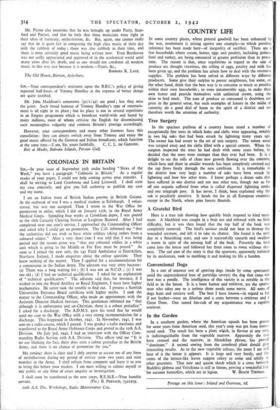COLONIALS IN BRITAIN
Sta,—In your issue of September 25th under heading "News of the Week," you have a paragraph " Colonials in Britain." As a regular reader of your paper, I could not help coming across your remarks. I shall be writing to Lord Cranborne and Lord Listowell. I shall state my case concisely, and give you full authority to publish my case and my name.
I am an Indian born of British Indian parents in British Guiana. At the outbreak of war I was a medical student at Edinburgh. I volun- teered, but was not accepted. Then I wrote to the War Office for permission to enlist, which I did on January 15th, in the Royal Army Medical Corps. Spending four weeks at Crookham depot, I was posted to the 18th Casualty Clearing Station at Leighton Buzzard. After I had completed over one year's service, I approached the Commanding Officer and asked why I could get no promotion. The C.O. informed me " that the authorities did not wish to have white soldiers taking orders from a coloured soldier." After a very short time I was told that I was being posted and the reason given was " that any coloured soldier in a white unit which is going to the Middle or Far East must be posted." As soon as I joined the new unit, the 141 Field Ambulance at Enniskillen, Northern Ireland, I made -enquiries about the colour question. They knew nothing of the matter. Then I applied for a recommendation for a commission in the Indian Army. The adjutant was very sorry because: (a) There was a long waiting list ; (b) I was not an N.C.O. ; (c) I was too old ; (d) I had no technical qualification. I asked for an explanation of " technical qualification." The adjutant said that, for instance, if I wished to join the Royal Artillery or Royal Engineers, I must have higher mathematics. He never took the trouble to find out. I possess a Scottish Universities Entrance Board certificate with higher maths. I took the matter to the Commanding Officer, who made an appointment with the Assistant Director Medical Services. This gentleman informed me " that although it is unfortunate and un-Christian, there is a colour prejudice." I asked for a discharge. The A.D.M.S. gave his word that he would send my case to the War Office with a very strong recommendation for a discharge. This happened in October, 1941. In November, 1941, I was sent on a radio course, which I passed. I was graded a radio mechanic and transferred to the Royal Army Ordnance Corps and posted to the roth A.A. Division. On July 3rd, 1942, I had an interview with the Officer Com- manding Radio Section loth A.A. Division. This officer told me " It is no use blinking the fact, there does exist a colour prejudice in the British Army, and there is no chance of promotion for you."
My conduct sheet is clear and I defy anyone to accuse me of any form of misbehaviour during my period of service (now two years and nine months) in the Army. I' shall refrain from comment and leave it to you to bring this before your readers. I am most willing to submit myself to any public or any form of court enquiry or investigation. • I shall soon be transferred to the new corps, R.E.M.E.—Your humble loth A.A. Div. Workshops, Radio Maintenance Coy.


























 Previous page
Previous page